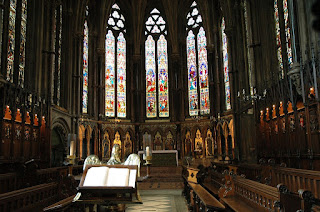Who speaks for the Elizabethan Settlement? Opening thoughts on Hampton's 'Grace and Conformity'
Unlike Prideaux, Howson had previously - in a 1598 sermon - critiqued the view of the Second Helvetic Confession that "The greater part of meetings for worship is ... to be given to evangelical teaching", that is, preaching. Howson quite rightly noted, "the Church of England hath no such constitution".
Which of the two, therefore, most authentically represents the Elizabethan Settlement? Quoting Peter McCullough, Hampton suggests that it is Prideaux, with his commitment to "the inherited Elizabethan commitment to the ministry of the Word through preaching".
Except that the Elizabethan Settlement did not regard preaching as the defining, central feature of public worship. From the outset, the Elizabethan Injunctions affirmed non-preaching ministers by providing for them to read "one of the Homilies, which are and shall be set forth for the same purpose by the queen's authority". The 1566 Advertisements instructed, "that no parson or curate, not admitted by the bishop of the diocese to preach, do expound in his own cure, or elsewhere, any Scripture or matter of doctrine, or by the way of exhortation, but only study to read gravely and aptly, without any glossing of the same, or any additions, the Homilies already set out". The aggressively Puritan manifesto that was the 1571 Admonition to Parliament attacked those clergy who were "bare readers", reflecting the common Elizabethan practice of bestowing orders on non-graduates to ensure that common prayer and administration of the Sacraments was maintained in parish churches.
And this, of course, was defended by Hooker, for whom the ordination of those with "a meaner degree of fitnes" allowed for "the service of publique prayer, to minister the sacraments unto the people, to solemnize mariage, to visit the sick and burie the dead, to instruct by reading although by preachinge they be not as yeat able to benefit and feed Christes flock". The alternative, which assumed that preaching was the central feature of public worship, would, Hooker contended, have been disastrous for the Elizabethan Church:
whether a Church wherein there is not sufficient store of learned men to furnish all congregations should do better to let thousands of soules grow savage, to let them live without any publique service of God, to let theire children die unbaptised, to withhold the benefit of the other sacrament from them, to let them depart this world like Pagans without any thinge as much as red unto them concerninge the waie of life, then as it doth in this necessitie to make such presbyters as are so farre foorth sufficient although they want that habilitie of preaching which some others have (LEP V.81.5).
Which brings us back to Howson and Prideaux on that day in 1624. Prideaux's insistence that the Second Helvetic Confession's declaration that preaching was indeed the heart of public worship and the defining characteristic of sacred space was, put simply, not at all in continuity with teaching and practice of the Elizabethan Settlement. Instead, it was Howson's 1598 sermon which articulated the vision and understanding of the Elizabethan Church that common prayer, the sacraments, and the occasional offices were central to the life of the parish church:
The house of God is called the house of prayer, either because all diuine seruice is comprehended vnder the name of prayer, or some Species of prayer; or els because of all diuine duties prayer is the chiefe; or else because in all actions of Christianitie and religion which are perfourmed in the house of God, prayer is euer one and an especiall part: As in baptisme, in the sacrament of the supper, in matrimonie, in churching of women, in burying the dead, in preaching the word; besides the ordinary action of common prayer it selfe which is as iuge sacrificium, the sacrifice which God requireth euerie day, not only priuatly in our chamber, but especially togither in the Church of God.
This, indeed, was more than implied in 'An Homilie for repayring and keeping cleane, and comely adorning of Churches' (and it is significant that such an address was included in the Elizabethan Book of Homilies):
to the intent that yee may be partakers of GODS manifold blessings, and that yee may be the better encouraged to resort to your parish Church, there to learne your duetie towards GOD and your neighbour, there to be present and partakers of Christs holy Sacraments, there to render thankes to your heauenly Father for the manifold benefits which hee daily powreth vpon you, there to pray together, and to call vpon GODS holy Name, which be blessed world without end. Amen.
It was "the likes of Howson" - a rather dismissive description of the Elizabethan mainstream - with their more holistic view of the ministry and life of the parish church, finding chief expression in common prayer, sacraments, and occasional offices, who represented the Elizabethan Church, not Prideaux with his concern to agree with the Second Helvetic Confession. Learned sermons on aspects of predestination by Prideaux were not the heart of the Elizabethan and Jacobean Church. Judith Maltby tells of Thomas Shert, a non-preaching cleric in Macclesfield, whose thirty year ministry was defended by his parishioners when, in 1604, the mayor moved against the curate out of a desire for a preaching minister. For the likes of Prideaux, the preaching of Reformed doctrine may have been regarded as fundamental to the life of the English Church. As Maltby notes, however, "To others" - such as Shert's parishioners - "the more mundane daily tasks of parochial ministry were what earned credibility and respect in the long run". The non-preaching minister reading Common Prayer and Homilies, administering sacraments and occasional offices, quietly and peaceably nurturing and sustaining a parish in the life of faith, was more representative of the Elizabethan Settlement than was Prideaux. And it was this that "the likes of Howson", with Hooker, defended.




Comments
Post a Comment